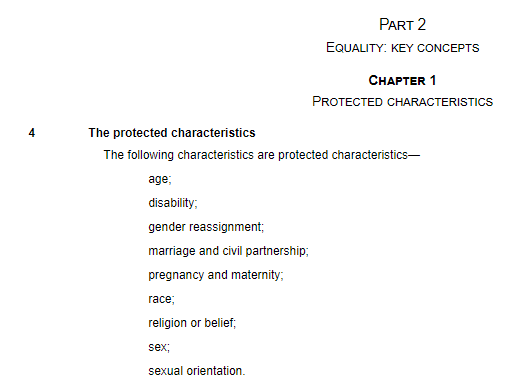
Hi @northantspolice @northantsopfcc @EHRC @EHRCChair @KishwerFalkner @RJHilsenrath @trussliz @GEOgovuk
The 'Diversity Survey' in your job application states:
"Our company does not discriminate on the basis of gender identity."
However...
1/17
The 'Diversity Survey' in your job application states:
"Our company does not discriminate on the basis of gender identity."
However...
1/17

'Gender identity' is not a protected characteristic under the Equality Act 2010 and is not defined in the Act.
legislation.gov.uk/ukpga/2010/15/…
2/17
legislation.gov.uk/ukpga/2010/15/…
2/17

If you choose to discriminate on characteristics (such as 'gender identity') that are not protected characteristics under the Act, you may inadvertently indirectly discriminate on protected grounds.
3/17
3/17
You then ask " Which of the following options best describes your sex?" with options:
Male
Female
Intersex
Other.
4/17
Male
Female
Intersex
Other.
4/17

The only two possible options for sex are 'Female' and 'Male' as defined in the Act and consistent with biology, - 'other' is not a valid option.
legislation.gov.uk/ukpga/2010/15/…
5/17
legislation.gov.uk/ukpga/2010/15/…
5/17

Intersex is not a sex class and those with a Difference of Sex Development are still considered to be of the male or female sex class. It is generally considered derogatory to those with DSDs to consider them not to be male or female.
6/17
6/17
You then ask "What best describes your gender?" with options:
Male
Female
Prefer to self describe
Transgender.
7/17
Male
Female
Prefer to self describe
Transgender.
7/17

'Gender' is not a protected characteristic under the Equality Act 2010 and is not defined in the Act.
legislation.gov.uk/ukpga/2010/15/…
Male and female are the two sexes and are not 'genders'.
8/17
legislation.gov.uk/ukpga/2010/15/…
Male and female are the two sexes and are not 'genders'.
8/17

'Gender' relies on demeaning, regressive stereotypical notions of societal roles for the two sexes, concepts that I'm sure you would not wish to be associated with.
9/17
9/17
There is a protected characteristic of 'gender reassignment', but the terms you use here are not used or defined in the Act.
legislation.gov.uk/ukpga/2010/15/…
10/17
legislation.gov.uk/ukpga/2010/15/…
10/17

Asking about a personal characteristic such as 'gender' that is not a protected characteristic under the Act, may be in breach of the GDPR by processing personal - and potentially Special Category - data without a lawful basis.
11/17
11/17
If you choose not to gather data on specific protected characteristics (such as sex), you cannot have the information required to ascertain whether or not you could be discriminating on protected characteristics in recruitment. This could be vital in an employment tribunal
12/17
12/17
If you choose to discriminate on characteristics (such as 'gender') that are not protected characteristics under the Act, you may inadvertently indirectly discriminate on protected grounds.
13/17
13/17
Given these errors and your use of incorrect terms, it's not clear how you can meet your Public Sector Equality Duty or how you have met it in the past given your data could have been corrupted by those who didn't provide their sex.
14/17
14/17
Nor is it clear how you can have had due regard to the other duties given the data you have collected.
15/17
15/17
Language and meaning of words are important and proper use & understanding of terms is vital so that the public is aware of what rights they have and what your duties are. Any confusion or inconsistency over meaning may prevent people from accessing their rights in law.
16/17
16/17
Will you undertake to correct these errors and to review all your other policies, documents, reports, etc to ensure compliance?
Please respond.
sexnotgender.info/list
17/17
Please respond.
sexnotgender.info/list
17/17
@threadreaderapp unroll
• • •
Missing some Tweet in this thread? You can try to
force a refresh



















